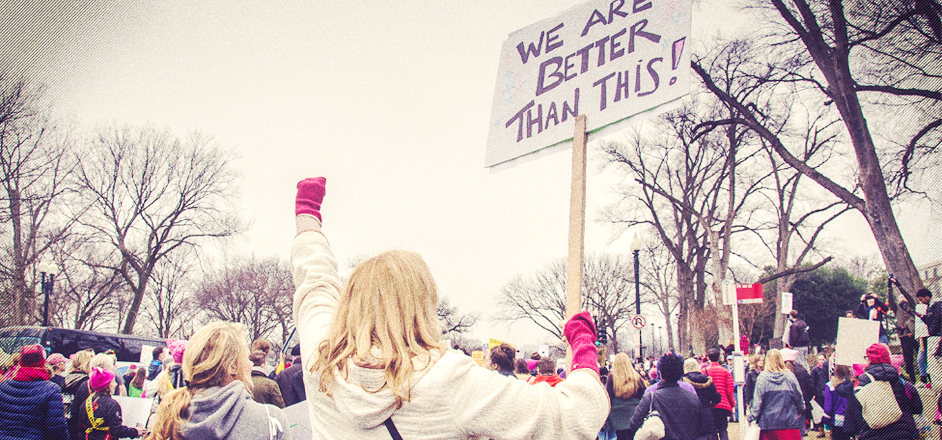I realized in my early twenties that a lot of my political views sucked. Big time. And before then, I hadn’t actually given a lot of thought. They weren’t based off of my own convictions or experience with reality.
So why did I have such sucky beliefs?
“I didn’t understand politics until recently,” Laney Ross, 26, laughs while flipping her bright pink shoulder length hair, black eyes sparkling.
“But, even as a kid on the playground, I can remember arguing with other kids about who should be president,” she said.
She and millions of others are part of a social science theory called political socialization, according to Oxford Reference, which says that politics are socialized in young children early on. And, the younger something is socialized into someone, the harder it is to change.
In practice, what your family believes often becomes what you believe through this process of socialization. Regardless of your own personal experiences.
Ross understands this, saying that although her parents are “very conservative,” she takes a much more liberal viewpoint now. But it wasn’t always like that, not until her teachers challenged what it was she thought she knew.
“At first, when friends and I would talk about politics, and when it would come up during classes [in high school and college], I would be really defensive about my position,” she says. “But then one day, a professor asked us to write a paper about why we believed what we did without referencing anyone we actually knew in person, like family and friends. I couldn’t do it. And it helped me change some, but not all, of my views.”

Harris, 28, (who asked to go by his last name only), says that his family was absolutely neutral in politics because of their religion. So, he didn’t experience a lot of socialization during early childhood regarding politics.
But his parents’ and religion’s ideals still influenced him, and Harris says it was hard for him to change many political views, especially those surrounding aid.
“I used to be really against a lot of programs for homeless or low income people because I thought it was wasting money when people could just get a job or whatever,” he says. “Then I became homeless and realized how hard it is to actually get help or to break out of that cycle. You’re hungry and dirty and no one wants to hire you if you’re dirty and don’t even have an address to put on applications. It really took something dire to make me change my mind. I learn things the hard way, I guess.”
It’s not about being stubborn; Harris is actually a product of his upbringing.
One such study shows that people often dismiss any evidence that contradicts their own beliefs and also looked at what actually happens in your brain when you’re presented with evidence that long-held political beliefs may be incorrect.
When faced with this evidence, the default mode network — a part of your brain that basically controls how you see yourself and view yourself as separate from everyone else — increases in activity. People who change their political views when presented with evidence showed less activity in the insula and amygdala, which both play large roles in emotional processing.
Politics is a deeply rooted emotional and cognitive thing in the minds of humans, and our brains hold our political views in line with our views of ourselves.
So, when people are defending their beliefs in policies, their brains believe they actually have to defend themselves.
Which may explain why the advice is to avoid talking politics at Thanksgiving if you don’t want mashed potatoes and rolls to start flying across the room and into grandma’s bourbon.
Hard as it may be, it is possible to work against the subconscious actions of your brain. Ross did it, but says that changing her political views, though freeing, was also exceptionally difficult.
“It was a big part of my identity to try to sort out what I actually believed over what my parents believed,” she explains.
The neuroscience behind political views could explain why so many people tend to change political opinions in their formative teens and twenties, when they are focused on discovering their own identity, and why it seems so hard to convince older people why policies may be good or bad.
Heidi Reid, 45, says that she's “conservative, but not Republican” and expresses distress that her son is “very liberal.” She believes it had more to do with his public education than cognitive or socialization reasons.
However she does agree, “It’s hard to change anyone’s mind about politics. I did change my mind about abortion a few years ago, because of a situation where my sister-in-law was in a life-threatening situation for her and the baby and needed one or they would both die. Before I was very against them for any reason. So, I guess it takes life or death to change my mind.”
Socialization, self-identity and brain chemistry all play a role in why we hold our political views. People think they need to defend their own sense of self when politics come into play. So changing anyone’s political mind is as complex and difficult as changing their identity or self.
Everyone would be wise to remember the rule of thumb one 80-year-old coworker of mine used to say whenever politics would come up at work.
“Political opinions are like penises,” she’d say. “A lot of people have them. But just because you have it doesn’t mean you should just wave it around at everyone.”
Hers is reason enough for everyone to examine carefully why we have our political views in the first place. Is it because of socialization? Is it because of our brain chemistry?
And, is it going to take a life-altering situation to change them?




Leave a Reply